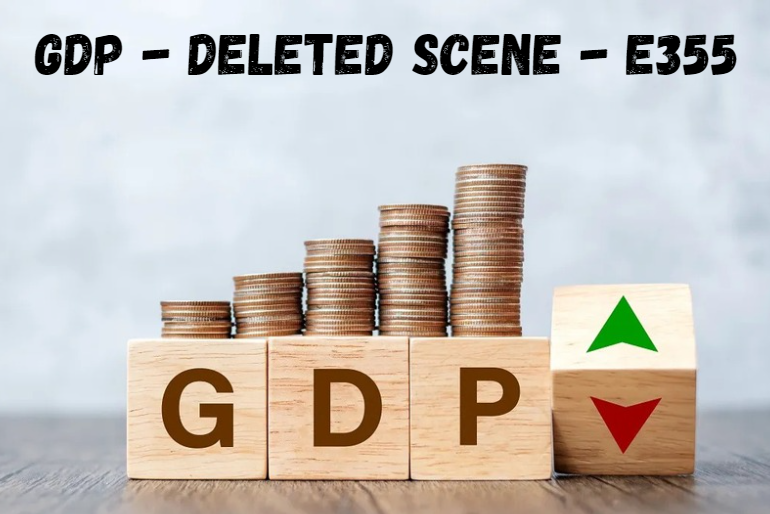In the world of economic analysis, deleted scenes can often hold surprising revelations. One such scene, from “GDP – Episode 355” (referred to here as GDP e355), showcases valuable insights about economic forces, human behaviors, and the subtle dynamics of GDP—a key measure of economic health. Though brief, this deleted segment in GDP e355 gives viewers a deeper dive into the economic impact of individual decisions, structural policy, and even global trade implications.
In this article, we’ll explore what makes this deleted scene so compelling, why it was cut, and the lessons we can extract from it to gain a richer understanding of GDP and its role in our lives.
Introduction
The deleted scene from GDP – Episode 355 might have only briefly touched on GDP, but it opened up critical viewpoints for understanding the economic landscape. Deleting it may have been necessary for flow or timing, but in doing so, it removed crucial commentary on how everyday choices, government policies, and global trade policies all impact the broader economy. In re-examining this scene, we uncover several overlooked but essential insights that hold powerful implications for viewers’ understanding of economics and GDP.
Understanding GDP in a New Light
What GDP Really Measures
Gross Domestic Product (GDP) is commonly known as the total monetary value of all goods and services produced within a country over a specific period. This economic measure helps analysts gauge the size and health of an economy, identifying trends in productivity, investment, and consumption. GDP numbers are often indicators of a nation’s living standards, yet this measure doesn’t account for factors like wealth inequality, environmental costs, or informal economic activity.
The Impact of GDP on Everyday Life
For the average person, GDP can seem abstract, detached from the realities of day-to-day life. However, a closer look reveals that GDP impacts everyone. It influences job markets, wage levels, and even government decisions about social programs, infrastructure, and education. This particular scene in GDP e355 touches on these connections in an engaging way, illustrating how individuals and small businesses can influence GDP.
Why Deleted Scenes Like e355 Matter
Economics Beyond the Basics
Deleted scenes like the one in GDP e355 may seem secondary, but they can reveal deeper insights that enrich our understanding. In this scene, the creators delve into how GDP figures are not just about macroeconomic data but about the collective outcomes of individual decisions, government policies, and industry trends. For students of economics, this perspective is crucial—it’s not just about knowing GDP figures but understanding the “why” behind them.
A Closer Look at Scene e355
In the scene, a subtle focus is placed on various components of GDP, particularly consumer spending and business investments. The segment highlights how small businesses drive economic health, directly influencing the services sector—a major contributor to GDP in most modern economies. Additionally, the scene discusses the limitations of GDP as a measurement, pointing out that it doesn’t include factors like environmental sustainability and social well-being.
Economic Insights from GDP e355
Personal Choices and GDP
A unique feature of this deleted scene is its attention to the power of individual economic decisions. It suggests that daily choices, like spending, saving, or investing, have a compound effect on the economy. For instance, increased consumer spending drives demand, prompting businesses to invest and hire, ultimately boosting GDP.
Policy Implications Explored
Beyond personal choices, this scene also examines the impact of government policies on GDP. Whether through tax incentives for businesses or subsidies for renewable energy, policy decisions affect economic activity in significant ways. The scene mentions specific policy measures that could either stimulate or contract the economy, sparking a debate on fiscal and monetary policy effectiveness.
How Deleted Scene e355 Impacts Economic Perceptions
Shifting Perspectives on Economic Growth
One of the most compelling aspects of this deleted scene is its challenge to the traditional notion that GDP growth equates to national prosperity. While GDP is a key economic indicator, it fails to address income inequality, environmental degradation, or social well-being. The scene encourages viewers to question what GDP doesn’t reveal and to consider alternative metrics like the Human Development Index (HDI) or the Genuine Progress Indicator (GPI) for a more comprehensive view of societal progress.
Social and Environmental Dimensions
The creators of GDP e355 use this scene to bring attention to the environmental and social dimensions often overlooked in economic discussions. For instance, while GDP might rise due to increased factory production, the corresponding environmental costs aren’t reflected in GDP figures. The scene proposes that a sustainable approach to growth would incorporate these factors, presenting a balanced view of economic progress.
What Viewers Missed in GDP e355
Hidden Messages in Scene e355
With its subtle yet powerful messages, this deleted scene held several hidden economic lessons. It indirectly suggests that understanding economics requires going beyond the data to consider societal values, environmental costs, and quality of life. In doing so, the scene asks viewers to question: “What does prosperity really mean?” and “How can we build an economy that serves people?”
Broadening Economic Discussions
While the main episode focused on GDP figures and their implications, the deleted scene added layers to this discussion. It questioned GDP’s role as the primary metric for economic success, suggesting that broader conversations on wealth distribution, sustainable growth, and policy effectiveness are necessary for a complete picture.
Conclusion
Though the deleted scene from GDP e355 never aired, it sheds light on essential aspects of GDP and its limitations as an economic measure. Through this lens, we see GDP not just as a number but as a reflection of our collective choices, policies, and priorities. By examining what was left out, we gain a deeper appreciation for the intricacies of GDP, including the importance of sustainability, personal choices, and policy. This scene, though deleted, underscores the need for a holistic approach to economics, where human well-being is central.
FAQs
What does GDP measure?
GDP measures the total monetary value of all goods and services produced within a country over a specific period, often used as a broad indicator of economic health.
Why was Scene e355 deleted?
While specifics aren’t clear, it’s likely that scene e355 was deleted for time constraints or to maintain focus on main themes. However, it provided rich insights into the limitations of GDP as an economic measure.
What insights does the deleted scene offer?
This scene emphasizes the impact of individual choices, policy measures, and environmental costs, offering a more nuanced view of economic growth beyond traditional GDP metrics.
How does Scene e355 redefine GDP?
Scene e355 suggests that GDP should not be the sole metric for economic success, advocating for complementary measures that address quality of life, environmental sustainability, and social well-being.
Why is GDP criticized?
GDP is often criticized because it doesn’t account for income inequality, environmental degradation, or informal economic activities. Critics argue for additional metrics that provide a holistic view of economic and social health.
What are alternative measures to GDP?
Some alternatives include the Human Development Index (HDI), Genuine Progress Indicator (GPI), and Gross National Happiness (GNH), each incorporating aspects of well-being and sustainability.



